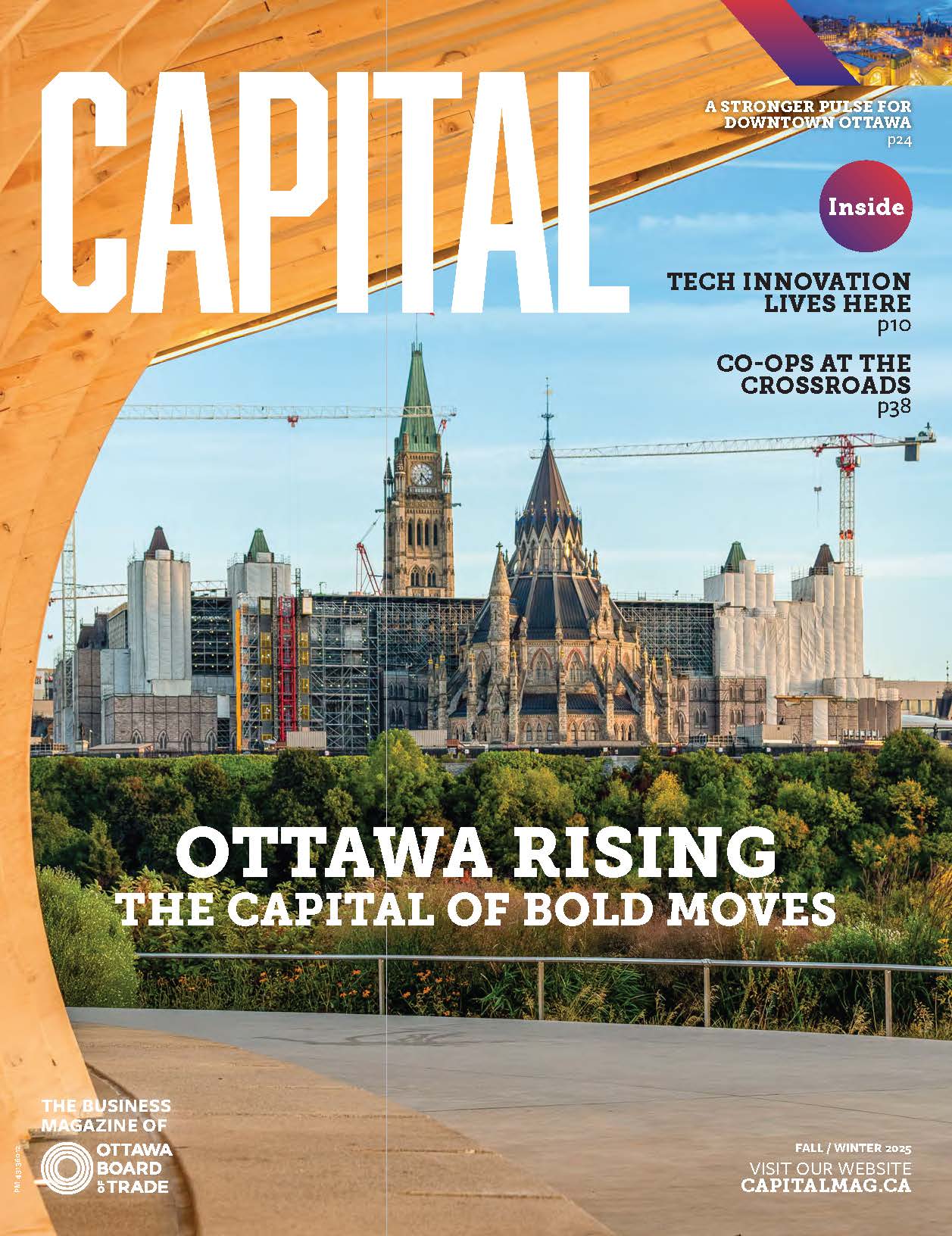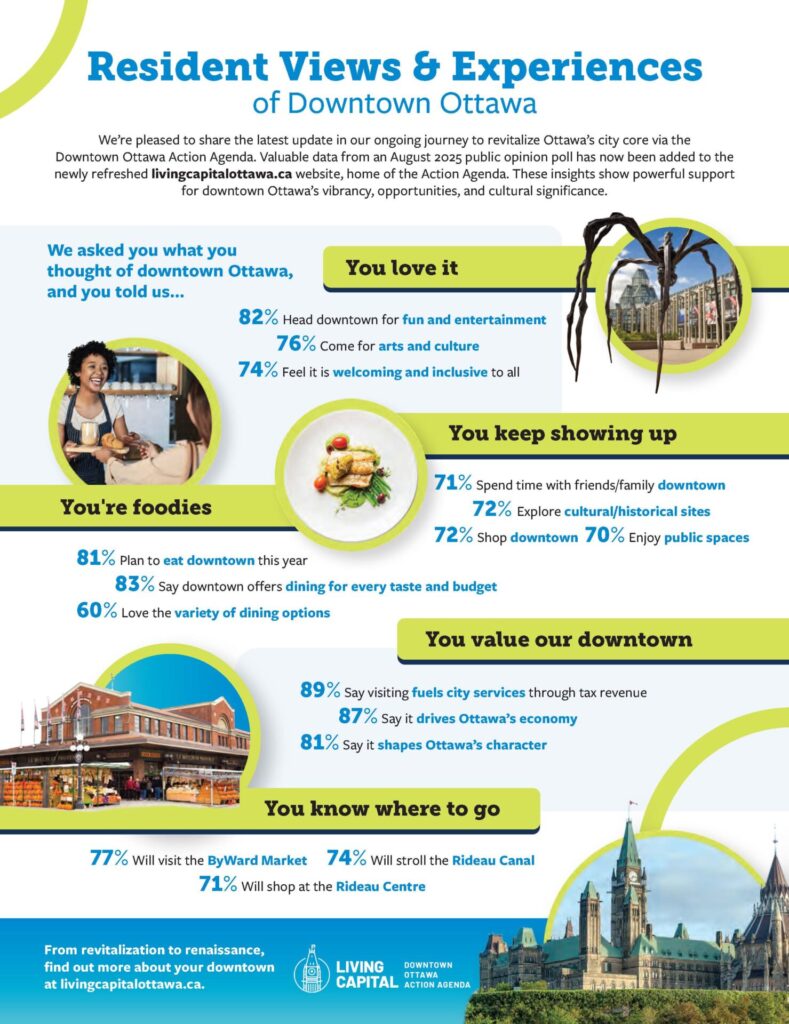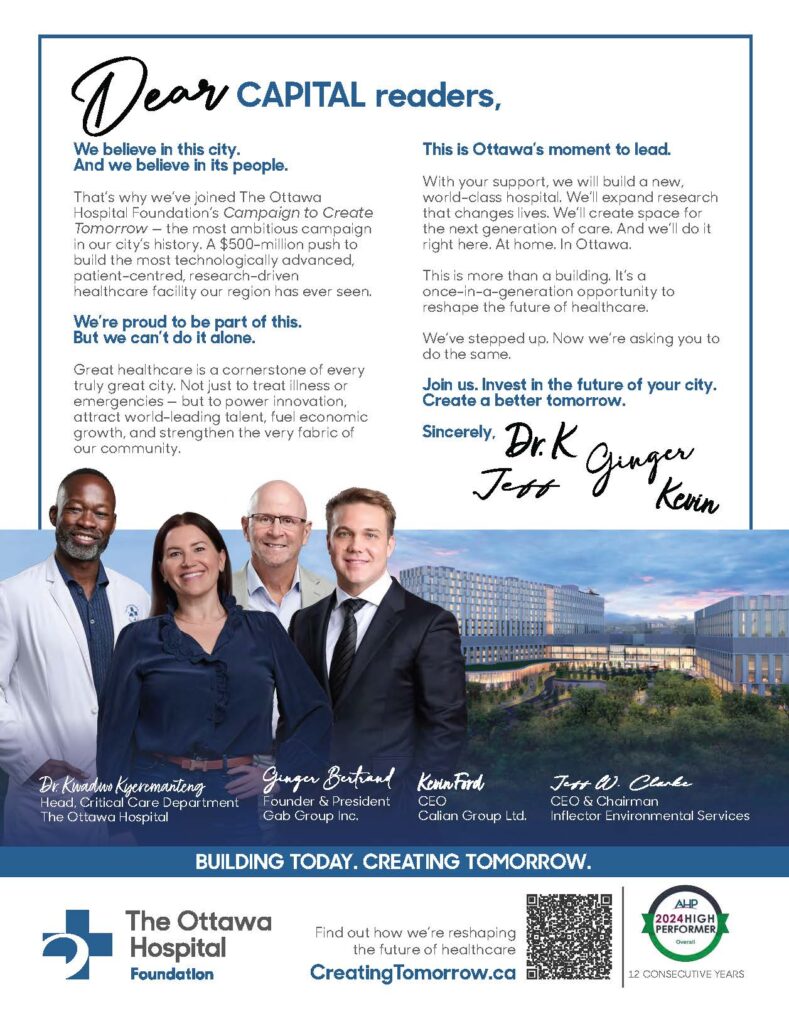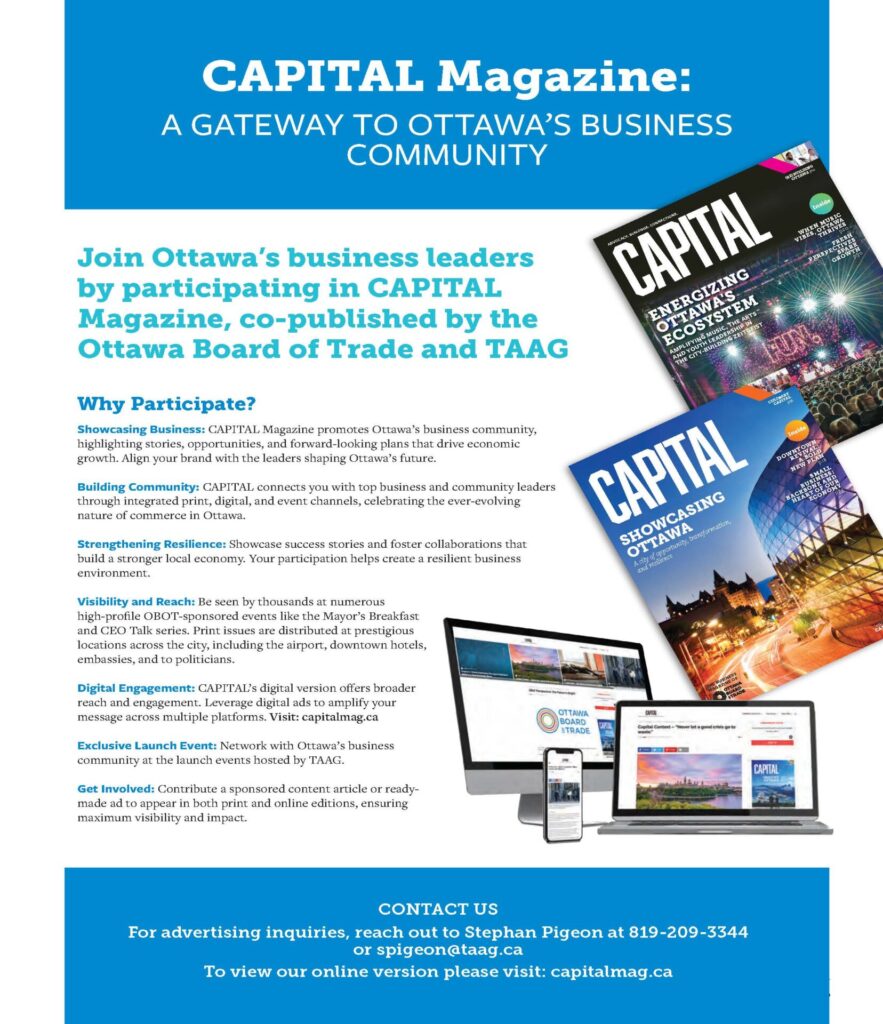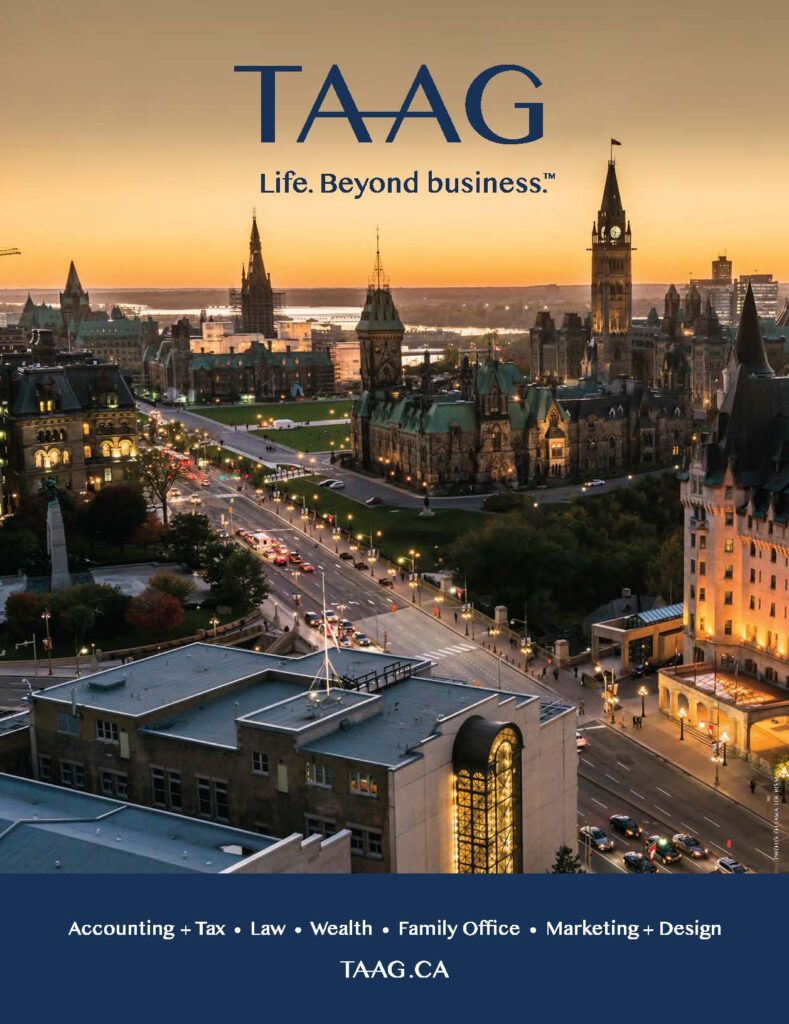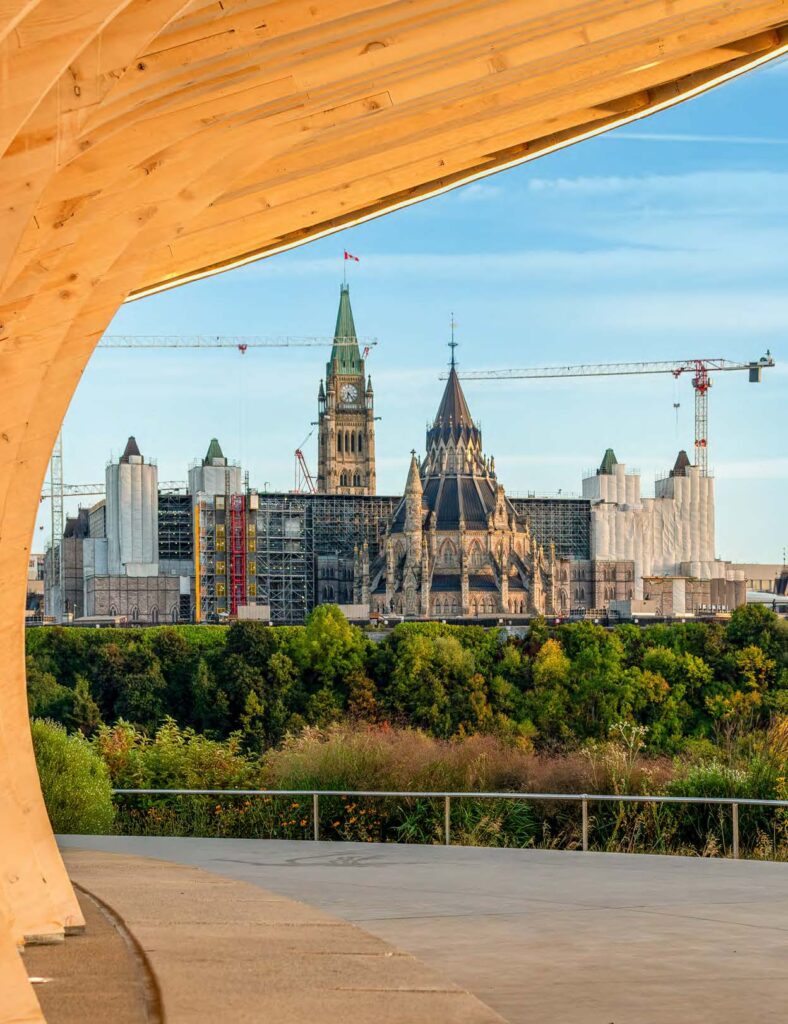C-Suite View

Ottawa has faced some very challenging, unprecedented times over the past several months. Here is how three prominent local business leaders view the impact of COVID-19 on our community, where we stand now, and what we need to focus on to optimize our economic evolution as we recover.
Ian Sherman, Tax Partner, EY Canada Chair, Ottawa Board of Trade 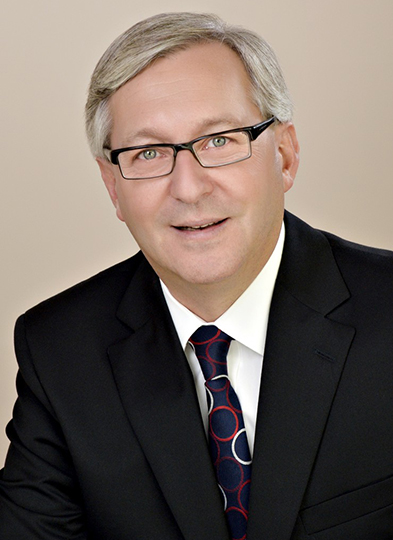
Ian Sherman has a unique vantagepoint on the local business community as it grapples with the COVID-19 pandemic. As chair of the Ottawa Board of Trade, and a tax partner with EY Canada, a major accounting firm with clients spanning the breadth of all sectors, he has seen many successes and struggles up close.
Certain businesses, including those in professional services – such as EY Canada – and high tech, have adapted successfully to a remote work environment. But others have faced significant challenges, he says.
“Over the coming months, if patterns continue, the restaurant sector, and to a large extent the retail sector – especially those that don’t have the ability to pivot and rely as much on the shift from on-site to online, are going to need support, and government policy needs to reflect that,” Sherman elaborates.
Most EY partners believe remote work will need to prevail for at least the first half of 2021, and potentially longer. But they have also observed a longing in the community to return to business as usual.
“When I talk to many CEOs in a variety of sectors, there is a strong appetite from a corporate culture perspective to get back to some level of business life that involves the office,” Sherman says.
We have to maintain our entrepreneurial spirit. We have to continue to be resilient. We need to have a positive growth mind-set.
Sherman is concerned about spiralling out-of-control deficit levels, and is calling on all levels of government to, when rebuilding from the pandemic, carefully balance limited funds with the need to continue advancing important infrastructure initiatives that the Ottawa Board of Trade has long advocated for, such as the redevelopment of the LeBreton Flats, redevelopment, including enhanced safety and security of the ByWard Market area, and the critical needs of the New Civic Campus Project of the Ottawa Hospital.
He is encouraged by how hard authorities, both in government and in health care, are working with business to organize around the right initiatives to pull us through this crisis, and hopes that cooperation will continue post-COVID.
“We have to maintain our entrepreneurial spirit. We have to continue to be resilient. We need to have a positive growth mind-set,” Sherman asserts.
“Ottawa will re-emerge, there’s no question. I would encourage the local business community to remember that we are all in this together,” he stresses. “With courageous leadership, we can convert some of today’s sobering messages and return to being an unstoppable economy.”
Cyril Leeder, Chief Executive Officer of Myers Automotive Group-member of the Ottawa Board of Trade CEO Council 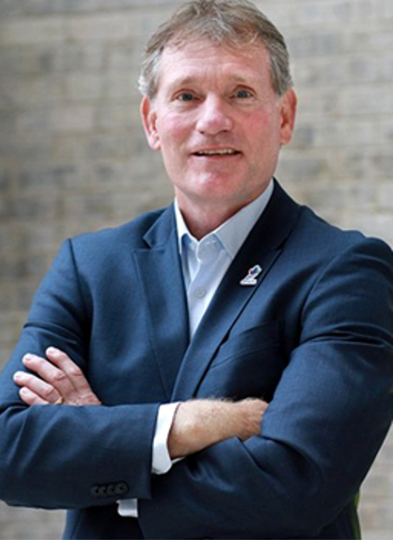
The COVID-19 crisis has had a profound impact on Ottawa’s downtown core, with traffic down about 60 per cent from pre-pandemic levels, as a large percentage of people work from home instead of commuting to their office, says Cyril Leeder, chief executive officer of Myers Automotive Group.
“There’s a good side and a bad side to that. The good side is we have a large part of our workforce that can work from home and still get paid full salary. The bad side is our downtown core is really suffering. Businesses that rely on people being in their offices – restaurants and cafés, retailers, hotels – it’s been really difficult on them,” he says.
Leeder’s industry has also experienced hardship. Although the national and local auto industry is in a recovery phase after the worst three months in its history between March and May, year-over-year monthly sales are still only at only 80 to 90 per cent compared to 2019.
Leeder believes local businesses will implement permanent changes as a result of their pandemic experience, including digital solutions that give customers the option of transacting online. “We’re certainly going to be doing that. We’re going to have an omni-channel platform and a protocol going forward,” he says.
There’s a good side and a bad side to that. The good side is we have a large part of our workforce that can work from home and still get paid full salary. The bad side is our downtown core is really suffering. Businesses that rely on people being in their offices – restaurants and cafés, retailers, hotels – it’s been really difficult on them.
Another change is that Myers and other businesses are using new performance measurements based more on efficiency.
“We know we may not be able to beat those numbers every month over month, so how can we be more efficient in our business? Those are measurements like dollar generated per employee, or how much marketing dollar do we need to spend per unit sold? We’ve been using those types of efficiency measures since May,” Leeder explains.
Leeder is impressed by how responsible businesses have been in implementing the proper protocols and safety measures for their customers and employees. “Business leaders take this very seriously. They want to do the right things to get us through the pandemic,” he says.
Leeder encourages citizens to help rebuild consumer confidence by continuing to do as much of their normal routine as possible, including going to the local grocery store, and supporting restaurants by taking out on occasion, as safely as they can while adhering to public health guidelines.
Hugh Gorman, Chief Executive Officer of Colonnade BridgePort-member of the Ottawa Board of Trade CEO Council
Colonnade BridgePort manages local properties across a full spectrum of asset classes, including office, retail, industrial, and residential sectors, providing the company with a panoramic view on how COVID-19 has impacted different businesses across the city.
“The economy is like a chain, and the weak links need to be supported,” says chief executive officer Hugh Gorman.
For example, “there are tenants that were shut down, and they didn’t have a year or two years worth of revenues built up, and there was no way for them to pivot and generate revenue immediately. In other cases, there were stronger tenants that were open and generating revenue,” he explains.
To hear what people are doing from a business perspective to adapt has really been quite remarkable. The business community has taken a leadership role in collaboration with local political and health officials.
Gorman notes that employees working from home during the pandemic crisis – both for Colonnade BridgePort and other local businesses – has worked out better than expected, and he believes this will lead to more long-term flexibility in working arrangements. “People having to be in the office every day is a thing of the past, but it’s been accelerated by this. I don’t think it’s the death of the office by any stretch of the imagination, but there’s going to be a different use of space going forward,” he predicts.
This is also true of retail. For example, some shopping centres were already adapting to mixed-use space before the pandemic, and others will now need to do the same thing in light of their recent experience, says Gorman.
Gorman says the local business community has also done a great job in maintaining confidence that as people get back to work, they are doing so in a responsible manner that doesn’t expose anyone to significant additional risk.
“To hear what people are doing from a business perspective to adapt has really been quite remarkable. The business community has taken a leadership role in collaboration with local political and health officials,” he says.
But Gorman wants to see more concrete public health data to support business-related decisions, such as the imposition of restrictions or shutdowns, so that the leaders of affected companies can plan in advance.
“I firmly believe that we’re going to come out of this with a commitment to doing what we were doing previously better. We were all feeling really bullish about the future of business in the City of Ottawa pre-pandemic, and we’ll figure out ways to rebound coming out the other end,” says Gorman.




